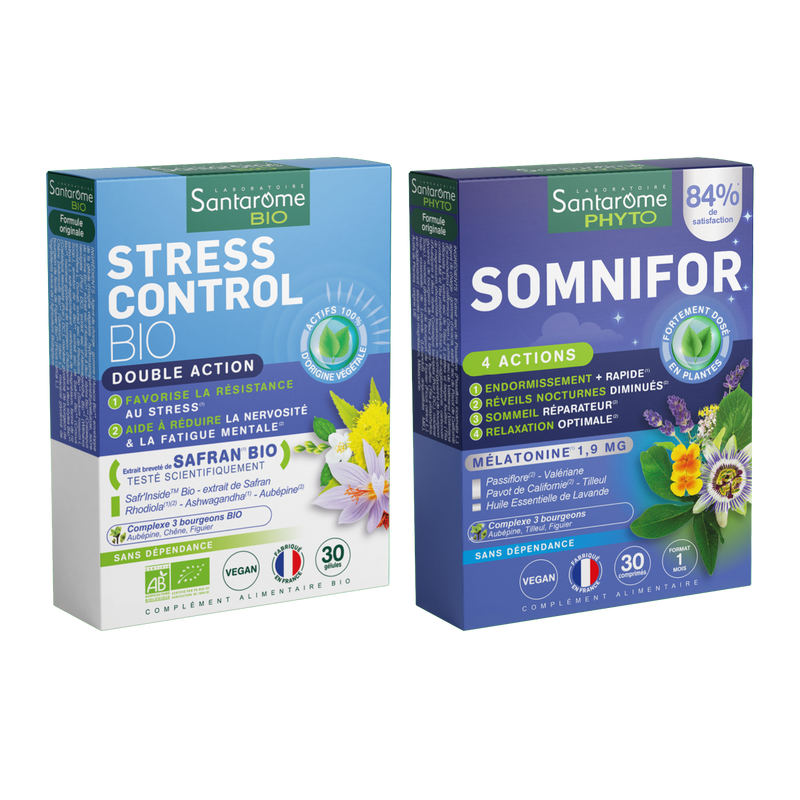How many hours of sleep do you need to be in good shape?
Written on 11/15/2025 by Pauline de Santarome
Sleep disorders affect a significant portion of the population: 36% of French people report suffering from sleep deprivation.
This is therefore a genuine public health issue that must be taken seriously.
Sleep requirements vary greatly from person to person: some people wake up feeling refreshed after six hours of sleep, while others need eight hours of sleep per night to be healthy.
Why is sleep important?
Sleep has a direct impact on our well-being, but also on our health: lack of sleep increases the risk of heart attack by 48%.
It is often overlooked that a sleepless night has the same effect on the body as one gram of alcohol, which is twice the legal limit for driving!
Sleep deprivation has biochemical, psychological, and physiological repercussions.
In addition, sleep plays an important role in our ability to work, memorize, and concentrate, as well as in regulating our moods. Sleep is essential for brain maturation and plays a fundamental role in neural connectivity. By strengthening neural circuits, it helps consolidate memory skills.

Sleep requirements change with age
We don't all need the same amount of sleep depending on our age: in 2019, the National Sleep Foundation published a study highlighting individuals' sleep needs according to their age.
For newborns between zero and three months old, between 14 and 17 hours of sleep per day are recommended.
For children up to one year old, the recommended average amount of sleep is 12 to 15 hours.
Until the age of two, an average of 11 to 14 hours of sleep is necessary.
From three to five years old, children need 10 to 13 hours of sleep per day, which can be divided between nighttime and naps (for example, bedtime at 8:30 p.m., wake-up time at 8 a.m., and a one-hour nap after lunch).
From the age of six, children's sleep requirements decrease; however, it is important to note that they still need much more sleep than adults, and this continues until adolescence. Nine to eleven hours of sleep per day is recommended. Ensure that lights are turned off at a reasonable hour.
Teenagers go through a period during which their bodies undergo many changes, which generally makes them very tired. The NSF study found that between the ages of 13 and 17, young people still need 8 to 10 hours of sleep per day.
The body then reaches adulthood, and needs change: the recommended average amount of sleep is 7 to 9 hours per day. It is interesting to note that the average number of hours of sleep in France is 6 hours 42 minutes on weekdays: we therefore sleep less than the recommended average. It should also be noted that people who need less than six hours of sleep per day represent a tiny proportion of the population.
Older people need fewer hours of sleep: from the age of 64, between 7 and 8 hours of sleep is sufficient.
Am I a light sleeper or a heavy sleeper?
The choice between being a light sleeper or a heavy sleeper depends on how much sleep you need to feel rested and alert during the day. Some people feel fine after just a few hours of sleep, while others need more time in bed to fully recover.
To determine whether you are a light or heavy sleeper, you can observe your sleeping habits over an extended period of time. Note how many hours of sleep you get each night and how you feel during the day. If you wake up naturally without an alarm and feel energetic and alert after only a few hours of sleep, you may be a light sleeper. On the other hand, if you have trouble waking up in the morning and feel tired throughout the day, you are likely a heavy sleeper.
It is important to note that sleep needs vary from person to person and can also change with age, level of physical activity, and other individual factors. The key is to find the amount of sleep that allows you to feel rested and functional throughout the day.
How can you improve your sleep?
To improve your sleep, it is important to consider several aspects of your environment and habits. Here are some tips to promote good quality sleep:
-
Limit screen time: The blue light emitted by cell phones, computers, and televisions can disrupt our circadian rhythm and inhibit the production of melatonin, the sleep hormone. It is recommended to limit screen time at least three hours before bedtime. Instead, opt for relaxing activities such as reading a book or listening to soothing music.
Control the temperature in your bedroom: the ideal temperature for promoting good sleep is generally around 64°F. Make sure your bedroom is well ventilated and at a comfortable temperature. Weather permitting, sleeping with the window open can also promote good air circulation and help maintain a comfortable temperature.
Choose a suitable bedside lamp: avoid lamps that give off light that is too harsh or too intense, as this can stimulate your brain and make it more difficult to fall asleep. Instead, opt for soft, subdued lighting that promotes relaxation.
Establish a regular sleep routine: try to go to bed and wake up at regular times, even on days off. This helps regulate your internal clock and promotes better quality sleep. Establish a calming ritual before bed, such as reading a few pages of a book, practicing meditation, or doing breathing exercises.
Exercise regularly: Regularly participating in endurance sports, such as running or swimming, can help improve sleep quality. However, avoid intense exercise too close to bedtime, as this can increase your energy levels and make it more difficult to fall asleep. It is recommended that you exercise at least three hours before going to bed.
Choose foods that promote sleep: Certain foods can promote restful sleep. Foods rich in potassium, such as bananas and potatoes, are beneficial because they contain magnesium, which promotes muscle relaxation. Avoid heavy, high-fat meals before bedtime, as they can cause indigestion and disrupt your sleep.
Dietary supplements for a good night's sleep
Somnifor 4-action tablets Somnifor 4-action tablets from Santarome Bio are organic dietary supplements perfect for a restful night's sleep.
















